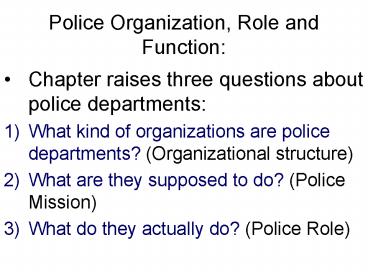Police Organization, Role and Function: - PowerPoint PPT Presentation
1 / 14
Title:
Police Organization, Role and Function:
Description:
Police Organization, Role and Function: Chapter raises three ... combines & confuses 3 different jobs: detectives, evidence technicians, and scientific analysts ... – PowerPoint PPT presentation
Number of Views:318
Avg rating:3.0/5.0
Title: Police Organization, Role and Function:
1
Police Organization, Role and Function
- Chapter raises three questions about police
departments - What kind of organizations are police
departments? (Organizational structure) - What are they supposed to do? (Police Mission)
- What do they actually do? (Police Role)
2
1) Organizational Structure
- Note the importance of agency size
- The Military framework
- Hierarchical
- Closed system
- Impersonality
- Formalization
- Professionalization
- Military culture group cohesion use of force
- Bureaucratic organization
- Division of labor specialization
- Emphasis on standardization accountability
3
2) Police Mission
- Police Mission entails multiple goals
- Law enforcement
- Order Maintenance
- Public Service
- Problem solving
- Protection
- Goals may be mutually conflicting
- Goals are broad diffuse (difficult to measure
success)
4
Closely related the Police Mandate
- Mandate Mission X Authority
- Authorization to
- Use coercive methods
- Search and seizure
- Use force (including deadly force)
- Use other extraordinary methods
- If Mission is internally incongruent, then police
are given an impossible Mandate
5
3) Police Role
- The Functions and Activities by which police try
to carry out their mission - Patrol Function
- Investigation Function
- Support Function
- Special Services
- The Styles and Strategies by which police carry
out these functions and emphasize different parts
of the mission
6
3) Police Role (cont.)
- Patrol Function the most basic and universal
part of policing - Almost all officers enter policing as patrol
- Small depts all officers are patrol
- Large depts largest number of officers patrol
- Different kinds of patrol activities
- General patrol
- Focused patrols
- Areas (hot spots)
- Activities (drug trade vice gangs special
problems) - Traditional patrol methods in-vehicle
- Advantages and disadvantages?
- Alternative methods foot bike boat horse
7
3) Police Role (cont.)
- Patrol Function Proactive vs. Reactive?
- Reactive responding to reports of crime
- Most crimes identified through citizen calls
- Response time critical factor?
- Proactive trying to prevent crime
- Aggressive patrols making arrests stops
- Deterrent patrols being visible
- Problem-solving patrols identifying troubles
- Outreach patrols connecting to community
8
3) Police Role (cont.)
- Patrol Function Experiments and Research on
Strategies - Kansas City experiment (deterrent patrol)
- Other studies of aggressive and targeted patrol
show more success (but not always) - Avoid simple general conclusions (which text
favors) - The results have been more mixed than it says
- Drawing strong conclusions from New York results?
9
3) Police Role (cont.)
- Investigative Function collecting information
- To solve crimes and identify suspected offenders
- To collect evidence and witnesses for prosecution
- General Investigation
- By patrol officers (first-responders) most
critical? - By detectives (following up on incident report)
- Half of cases are dropped not investigated
- Most investigations last only a few days
- Most crimes are not solved by detective work or
crime scene analysis (robberies burglaries
thefts arsons) - What about CSI? combines confuses 3 different
jobs detectives, evidence technicians, and
scientific analysts
10
3) Police Role (cont.)
- Investigative Function Other kinds of
Investigations? - Focused or targeted investigations
- By detectives in special units or tasks
- Limited to specific types of crimes or problems
- Drugs vice financial crimes fraud cybercrimes
- Proactive investigations
- Undercover
- Stings
- Raise considerable legal and practical questions
(e.g., entrapment corruption misconduct)
11
3) Police Role (cont.)
- Evaluation research on Investigation tactics
- Most cases unsolved
- Most investigations very brief
- Initial investigations by patrol officers
critical - Delay in calling police critical (greatly
reduces chances of solving case) - Technology is valuable in some cases but
over-rated in most
12
(No Transcript)
13
3) Police Role (cont.)
- Any Alternatives to the Traditional Professional
Policing Model? - Many tweaks and variations have been suggested
over the past 3 decades (but none have really
been permanent) - Most likely alternative Community Oriented
Policing - Different model of social control
- Different model of police organization
- Focus on collaboration problem-solving
14
3) Police Role (cont.)
- Community Oriented Policing Model
- Implementation
- Federal COPS program created in 1996
- Widespread adoption of elements of COP
- Few systematic implementations of COP as a true
alternative policing strategy - Very little meaningful research on COP
implementations - Future of COP is uncertain due to introduction of
Homeland Security?































